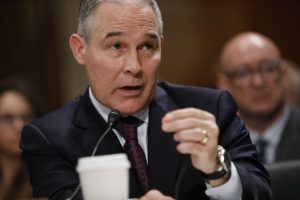
In the wake of Wednesday’s U.S. Senate hearing on Scott Pruitt as EPA’s next administrator, here are 10 reasons why lawmakers should reject the Oklahoma Attorney General as the nation’s top environmental official.
- Against Federal Pollution Controls: Pruitt has fought EPA efforts to limit toxic air pollution and greenhouse gas emissions from power plants and oil and gas developers, reduce the impact of air pollution on national parks, and clean up water pollution in the Chesapeake Bay.
- No Record of Environmental Enforcement: As Oklahoma’s Attorney General since 2011, Mr. Pruitt has no record of taking any action to hold polluters accountable for violating environmental laws. His website boasts 714 press releases, including more than 50 advertising his own speeches, testimony and lawsuits that challenge federal standards or EPA’s authority to even regulate pollution. But not one advertises any enforcement action against a polluter. Meanwhile, Pruitt’s campaign director, Harold Hamm, is an oil and gas billionaire who is reported to have pressured Oklahoma State to fire climate scientists.
- Poor Job in His Own State: Pruitt hasn’t exercised his authority to help clean up Oklahoma’s rivers and lakes. More than three quarters of the stream miles and lake acreage evaluated by the state fail to meet water quality standards. Mark Derichsweiler, a former manager in the state’s water program, has said Mr. Pruitt promoted industry interests, “at the expense of people who have to drink the water or breathe the air.”
- Conflicts of Interest: He shows no concern for conflicts of interest, or the difference between public service and private representation of specific industries. As Attorney General, Mr. Pruitt signed a letter drafted by Devon Industries objecting to EPA’s proposed regulation of toxic air pollution from oil and gas wells and tank farms. His office has retained Baker Hostedler, a law firm with a deep roster of energy industry clients, to draft legal briefs opposing EPA standards.
- Servant of Industry: He is an outspoken advocate of state’s rights, but reverses himself when it serves industry’s interest. For example, Pruitt sued in federal court to block California’s new law requiring humane treatment of egg layers at poultry operations. His lawsuit was bounced out of court when the judge found that Oklahoma failed to show the state had any real interest beyond protecting a small group of large egg producers perfectly capable of representing themselves.
- Won’t Stop Interstate Pollution: He does not understand EPA’s role in setting standards or enforcing laws that keep industries in one state from polluting the air or water in states that are downstream or downwind. For example, he filed a friend of the court brief to support the Farm Bureau’s lawsuit to stall the Chesapeake Bay cleanup that EPA and the affected states had already agreed to. The court rejected his claims in that case also.
- Dropped the Ball on Poultry Industry: Pruitt took no action to pursue a lawsuit that former Attorney General Drew Edmondson filed to stop Arkansas poultry operators from polluting Oklahoma waters. After the same industry contributed $40,000 to support his election campaign, he took no action to move the case forward but instead launched a multi-year effort to review the state’s own water quality standards for nutrients (which were re-confirmed after years of study).
- Disbanded Environmental Enforcement Unit: Pruitt dissolved the environmental enforcement unit set up by former Attorney General Drew Edmonson, which had brought more than 50 felony criminal cases against polluters and helped to secure a cleanup agreement and $5 million fine from a Tulsa refinery. Pruitt instead set up a unit to challenge federal authority and EPA’s right to set various environmental standards.
- Doesn’t Understand EPA’s Job: Mr. Pruitt has no understanding of the role that EPA plays in setting and enforcing environmental standards. When asked how multi-state pollution problems should be resolved at his Senate confirmation hearing on January 18, Pruitt said that EPA’s role was “informational” and that EPA’s involvement should come by invitation, and only after states have, “join[ed] together and enter[ed] into an agreement to address water quality issues….” But EPA’s authority to set and enforce standards to protect waterways that flow across state lines is exactly what is needed to get states to be willing to negotiate an agreement in the first place.
- Climate Skeptic: On perhaps the most pressing environmental issue of our day — climate change — Pruitt has denied the overwhelming scientific consensus that greenhouse gases from human industry are warming the atmosphere and oceans. “That debate is far from settled,” Pruitt wrote in National Review. “Scientists continue to disagree about the degree and extent of global warming and its connection to the actions of mankind.” That puts Pruitt at odds with NASA, the National Academies of Science, the United Nations Intergovernmental Panel on Climate Change and all other respected scientific bodies. During his Senate confirmation hearing, Pruitt admitted that climate change is not a “hoax” (as Donald Trump asserts) but said: “The ability to measure with precision the degree and extent of the impact (of climate change), and what to do about it, are subject to continuing debate and dialogue, and well it should be.”


